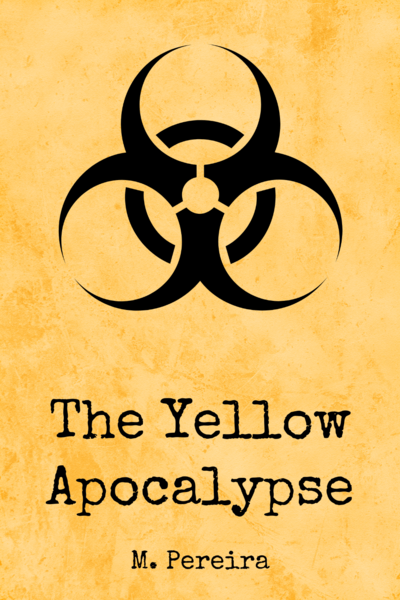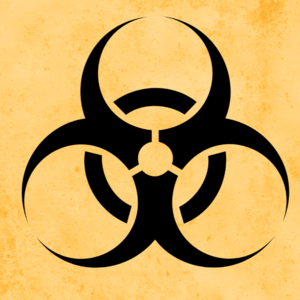“Is everything alright?”
Jacob stretched out his right hand to touch young Dinah’s forehead. Her rosy cheeks and the heat of her skin left no doubt — the fever was still high.
“It’s alright, dad.” Despite her bravery, the girl curled up on the seat, bothered by the seatbelt, pulling the blanket to her neck.
He accelerated the pickup truck a bit above the limit of prudence. The road from Brazópolis to Itajubá, narrow, crooked and without maintenance for years, was a risk only worth taking in extreme cases.
Cases like theirs.
He knew how the Plague began — he had already seen the fever hundreds of times. The pallor. The gradual memory loss. The screams. The empty faces…
He held the steering wheel with both hands again. He didn’t want to think about that. Maybe it was only the flu. Yes — the flu! And today of all days!
That morning, the few employees left in the farm had woken him up earlier than usual. Euphoric, they said they had unbelievable news to show. Wary, he followed them to the middle of one of the withered fields, up a hill. His mouth agape, he saw a banana tree. A healthy banana tree! With a bunch of yellow, firm, and, as he soon checked, delicious bananas!
Leah had to see that. The first piece of good news in months! He cut off a bunch and rushed back to the head office. Thin dust raised from the dry ground, smelling like death, but he didn’t care. Not that morning.
Once at home, he jumped up the stairs, yelling for Dinah to get up. They had to go as soon as possible!
“Come on, girl, quit it with the laziness! We have to…” But his voice died in his throat dried by the dust. Dinah was shivering under the blankets, even though they were in February.
He tried to return his attention to the road.
Would Leah have received the message? With the constant flaws in telecom infrastructure, he couldn’t be sure. Lately they had been using an old Cobra 148 GTL radio, which only worked when it wanted to.
The sun was already high in the sky. It hadn’t rained in three months, but Jacob didn’t complain. Not that time. He needed to get to the hospital fast, and a rain would only hinder him.
The smell of dry dust and earth bothered him. He still had in his memory the green of the pastures and of the remaining forests that covered the south of Minas Gerais. That covered the world. And to think that in five years practically everything had become dry ground…
He dodged a hole but fell on the next one. The pickup jumped with a weird noise and Dinah shuffled on the seat. The cold sweat was sticking her hair to her forehead. He slowed down, turning worried to the girl, and when he looked back at the road, found himself face to face with one of them.
Ω
Dr. Leah still hadn’t fallen asleep. Actually, she’d been getting less and less sleep, in irregular intervals. She didn’t need the biology course to know she had to sleep regularly, but damn it, the world had already gone to hell anyway! What difference would it make to die in one, two or ten months? From fatigue or from the Pest?
Then she thought about Dinah.
“Doctor, are you alright?” behind her, her assistant, clearly worried, stared suspiciously at her.
“I’m fine, thank you. And you don’t need to worry, I’ve already gotten tested this week.”
Baffled, the assistant turned in a stack of folders:
“These are the reports you asked for. We’ve lost the last data link with Brasília, so everything had to be passed by voice via radio and typed by hand.”
“My God… What a chore, huh?! Did you at least find anything interesting in there?”
“I didn’t notice anything, Doctor, just the usual — the population has stabilized at twenty million, the vegetation continues to decrease at the same rate of 12% per year. We don’t have access to the satellites anymore, but Brasília still does. They said that the vegetation in the Northeast is already at 5%. On the other hand, the isolation trench of the Amazon is ready. And they increased the frontier by one kilometer. The pictures should arrive by next week.”
“Well, if that’s the overview, I’ll leave it all to read tomorrow. Is Araújo already here?”
“No, ma’am.”
“Great. He’ll bring some Navy officers and I need to review some data. If anyone needs me, I’ll be in the meeting room.”
Before leaving the lab, she ran her eyes through the semitransparent greenhouse. Inside were some Petri dishes that read “Fusarium oxysporum strain XIII”. With a look of deep disdain, she said, “Bastard.”
Ω
The car stopped after a few meters, luckily without running the zombie over. Panting, Jacob looked at Dinah, who had barely noticed what had happened.
He hated finding them. He wished he was able to go straight past them and turn his face, leave them to their own fate. He knew nothing could save them, there was no treatment… but his conscience simply didn’t allow him. Disconsolate, he caressed Dinah’s warm face:
“Wait for dad. I’ll be right back, my love.”
He took his leather gloves and a mask from the glove compartment. The zombie, standing in the middle of the road, stared at him with a lost look.
Zombie, he thought. How can people joke about something like this?
Approaching cautiously, he cried, “Good morning, ma’am! Do you need help?”
The “zombie” was an old lady in her seventies, wearing a very dirty flowery dress that reached her ankles. Her disheveled hair gave away from afar the strong smell of urine and sweat that could be felt closer up.
Jacob knew that she was in an advanced stage of the disease. Her memory must already be a huge blank book and her motor functions were the next ones on the list. He thought about Dinah and shook his head. Just the flu… just the damn flu!
“Ma’am, come with me! Let’s have a coffee? Have you had your coffee today?”
Some families, out of fear of contamination or out of shame, left their diseased to sleep outside. When they woke up, bewildered and without memories, they wandered what was left of the world until they starved, or died of thirst, or were devoured by wild dogs just as starved as they were.
Jacob was approaching slowly, the old lady was staring at him with her head tipped to the left, as if she were trying to see the world from another angle, one that made any sense.
“Come on! Let’s have a coffee! You must be hungry, no?”
She seemed to recognize the word, and for an instant, a flash of happiness lit up her face.
“Coffee…” Jacob repeated.
The old lady, in an impetus, shouted, “Hunger!” and threw herself at him.
Caught by surprise, he tripped, and both fell on the asphalt, her with her teeth showing, in a ghastly grimace, trying to bite his shoulder.
But she was weak and no match for a man used to working in the fields. Recovered from the shock, it was easy to get rid of her. He managed to immobilize her with an arm lock, which showed that her peripheral nervous system was still working — she felt pain.
Led by force to the pickup truck, she was tied up inside the trunk. Resigned, she looked sadly at Jacob.
“I’m sorry for this. I’ll take you to a hospital, we won’t take long.”
Inside, Dinah was shivering. Drenched in sweat.
Jacob started the pickup, leaving marks on the bumpy road.
Ω
The School Hospital of Itajubá was now controlled by the Army’s 4th Battalion of Combat Engineering. It was the only way they could find to at least try and treat all the infected by the Plague.
Dr. Leah, adjusting the projector of the meeting room, remembered those days sadly. The outbreak had reached the city over five years ago, despite all precautions. In one week, over ten thousand people were infected. The Army declared curfew, but violence exploded. In two months, it was already twenty-five thousand infected. In one year… well, today the city was a huge desert of concrete, asphalt, stone, bricks and exactly six thousand, three hundred and twelve people.
The whole world had suffered with that, but the worst was still coming. Unfortunately.
No Hollywood movie had predicted that. The end of the world hadn’t actually been the fault of a meteor or an alien invasion or zombies. Zombies… what a bad joke…
It was a fungus’ fault. A damn fungus!
“Good morning, Doctor!”
Startled, she turned to the door. Lieutenant Colonel Araújo, her old acquaintance, and two other Navy officers were already walking in. The introductions were quick and informal, “…after all, time is a luxury we don’t have,” as Araújo said.
“So, Doctor, here we are, as you asked. I hope it’s good news.”
“It’s not, Colonel, I’m sorry.”
“Oh… it’s not. What a shame.”
“Gentlemen, please sit down. Before explaining the reason for this meeting, a quick recap of the most important facts of this crisis: in the decade of 50 of the last century, the Panama disease attacked and decimated the world’s banana fields, starting, as the name suggests, from the country in Central America.
“In fifteen years, the Gros Michel type of banana was decimated in the planet. Luckily a new type with a very similar taste was created — what we know today as Cavendish.
“However, the Cavendish hybrid is asexual, therefore its reproduction must be manmade. That’s why the banana ‘seedlings’ are actually grafts — small pieces of the plant that are removed and replanted.
“But in the 80’s, a variant of the Panama disease, a new strain of the Fusarium oxysporum fungus, began to kill the Cavendish plants. And as practically all banana trees are, so to speak, clones of a single ascendant, it was a matter of time until the disaster established again.
“As a solution, in the second decade of the XXI century, a new Cavendish hybrid was produced. Using genetic engineering, Embrapa researchers managed to produce a banana with the same taste and texture as the Cavendish, but extremely resistant to the disease.
“That hybrid spread throughout the whole world in only one year, and the industry was so absorbed in its celebration that it didn’t notice some alarming facts — after two harvests, the new plants became capable of reproducing without human assistance. What initially seemed like a bonus actually took a high toll — the species was extremely aggressive, decimating any other plants around it.
“In a few months, the banana fields began to kill pasture, other crops and even large forest areas.
“Panicking and facing lawsuits in every court in the world, the engineers that created the new Cavendish had the brilliant idea to improve the disease-causing fungus itself.”
“Fire against fire, isn’t that right, Doctor?”
“The idea was more or less that, Colonel. And in the beginning, it even worked — the fungus destroyed entire banana plantations in a few weeks, while also preventing their reproduction. But the relief lasted little — a mutation began to infect other plant species.
“As the test area for the fungus had been Malaysia, in two months the fungus was present in all of Asia. The continent’s vegetation cover was cut in half in one year. The crisis spread throughout the world. China and India, seeing their populations wither, declared war to England and to the United States, countries they accused of modifying the fungus with war purposes — a biological weapon.”
“Do you believe in that, Doctor?” asked one of the Marine officials, a Lieutenant Commander called Lima, glancing at his colleagues.
“No, Commander, I don’t. Anyway, while the war unraveled mainly in the Pacific, and despite all care for containment, the fungus reached Turkey and Africa. From there, it came to the Americas.
“The effect to our agriculture and to the environment was devastating. The vegetation cover was reduced in such a way that today it’s impossible to support livestock farming, simply because there is no pasture. We don’t have enough water sources to support any large city. But what nobody expected was for the fungus to suffer another mutation and begin to infect human beings as well, causing what is popularly called the ‘Plague.’ Today, according to the report I read, the Brazilian population is only 12% of its peak in two thousand thirty.”
“Well, Doctor, for as sad as it is, we all know that. The Army especially, since we were the ones who had to clean the streets taken by the zombies…”
“They aren’t zombies, Colonel. They are ill people!”
“Of course, Doctor, of course… Please, continue.”
Controlling her breath, Dr. Leah showed a new slide. In it, a heavenly beach could be seen.
“Fernando de Noronha?”
“Yes, Commander. One of the few places on Earth the fungus hasn’t reached.”
“Only we know at what cost, Doctor… to this day, the Navy takes down at least one ship or boat of desperates that try to get to the archipelago. But I don’t see what your point is. Don’t tell me the fungus…”
“No, Commander. The fungus hasn’t gotten to the archipelago. It got to the sea.”
The three men’s surprised reaction was almost hilarious, if it weren’t for the situation, Leah thought.
“You know, of course, that the oxygen we breathe is not generated in the forests.”
“No?”
“No, Commander. The forests, or rather the plants, generate oxygen during the day, through photosynthesis, but consume oxygen at night. For the air other living beings have to breathe, we must thank the set of aquatic organisms called phytoplankton.
“It’s the excess of oxygen produced by them that we and all the other animals use. And now…”
“Now you found the fungus in those organisms?”
“Luckily not, Colonel. Not yet. But we discovered it in whales found dead in the archipelago of Fernando de Noronha. And if the fungus is present in whales, it can, in thesis, contaminate other marine species. If it gets to the plankton…”
A heavy silence fell in the meeting room, broken only by the noise of the projector’s fan.
“Whales in Fernando de Noronha… that’s rare,” said one of the officers with something between fear and suspicion.
“It is uncommon,” the biologist continued, “but not so rare. This time, we imagine it was due to the fungus, which should have taken its central nervous system, leaving the humpback disoriented.”
A soldier knocked on the door, coming in right afterwards. He addressed the Lieutenant Colonel, whispering something to him.
“Excuse me, Doctor, there is an urgent issue, but I won’t take long. Please continue the meeting with my colleagues.”











Comments (0)
See all